Todd Perelmuter's Blog, page 22
April 14, 2024
How to connect with people when you feel like an outsider
As you undoubtedly know, our society has become much more fragmented in recent years. All of America used to be able to connect at the office water cooler by joking about the most-watched show on TV the previous night. Today, people work remotely, live TV isn’t really a thing, and everyone is following the fake lives of strangers instead of their own friends and family.
But! This fragmentation provides great opportunities to build communities of like-minded individuals who would have never been able to find each other. The key is to get into EXACTLY whatever it is you’re into. You’ll no doubt find groups online and off. If you live in a smaller town, you may need to broaden those interests, but people are people everywhere and we really haven’t changed all that much. We all still love meeting new people and having interesting conversations.
The biggest key to connecting is being fully present. This is how we go deeper than platitudes and cliches and get into what’s really going on beneath the surface. Of course, not everyone will be receptive, but most people are. Not everyone will share your values, but you can be thankful that their values were made clear sooner rather than later. And one of my favorite quotes is, “Why would I expect everyone to like me, I don’t even like everyone.” But to connect, you gotta put yourself out there, be present, and keep on building your tribe.
Join 10,000 Mental Steps ChallengeYou deserve happiness.Your loved ones deserve happiness.
Email JOIN The Art of Gratitude | Short FilmGratitude is the most important human emotion because it alone determines the quality of our life. This film is a roadmap back to our grateful hearts.
The post How to connect with people when you feel like an outsider appeared first on EastWesticism.
What Do You Do When Your Child is Toxic?
There is no secret recipe for raising perfect kids. There are countless influences in the world and not all of them are positive. A parent can not control everything a child hears, sees, and experiences.
Sometimes, despite our best efforts, kids can fall into drugs, a bad crowd, disrespect, and a refusal to listen. Parents are not robots, and it’s normal to get frustrated and reach a breaking point. In today’s article, I share some ways parents can keep their peace despite a lack of peace in the home.
I’ve Tried Everything and Nothing WorksFirst off, if you are reading this, you are clearly a very concerned and devoted parent. These things happen despite doing absolutely everything for our children.
We can’t change people unfortunately, but we can create the most supportive environment for that change to take place. Part of that involves letting go and realizing we can’t control others.
Often, that grasping, forceful energy we place on others pushes them away. Create a loving, inviting space so they know they’ll be welcomed in your arms for help one day (soon hopefully). Realize that you can only do your best, everyone makes their own choices, and remember that as people grow older, they tend to naturally grow up as well.
The Key to Peacefully Parenting a Toxic KidFirst, don’t lose faith, don’t lose your inner peace, stick to your convictions, and try to do so with love towards your child and yourself. This doesn’t mean we have to support it, condone it, or be happy about it. But we can accept it as simply the temporary truth of this moment, and there is peace in that acceptance.
The Truth About Guiding Toxic ChildrenThe universe is unfolding, with or without our consent. We can act in the world to bend it, shape it, and mold that unfolding. But we cannot fight it. We can work with it, but if we work against it we will only create our own suffering and waste all our energy. When we flow with the universe, we act without attachment to a future outcome. We act upon the world but we do so with stillness in our heart. This is how we can impact the world without depression if we fail.
We can work towards our parenting goals, we can work incredibly hard and put in tremendous effort, but we don’t have to attach our present moment happiness to some future event. This is what it means to flow.
You, like the universe and like every flower on Earth, can allow your life to open and unfold effortlessly and with peace. It’s just the repeated practice of accepting this moment, and then letting it go.
What to Do & How to Raise Toxic Children Under 18When children are under 18, they are not just our legal responsibility, they are also our opportunity. Under 18, we have more ability to shape and mold our children into responsible adults.
We must find that middle path — the balance — between acceptance and strictness, between backing off and discipline, and between authority and trusting them. But love must always be our center. Love is the sturdy foundational base for all relationships to blossom.
Love won’t just provide healing to a troubled child acting out. It will heal you as the parent and sustain you through the most challenging moments.
Remember, no matter how hard it is to see, rebellion and misbehavior are always signs of a troubled child. We use drugs because we are sad or have negative thoughts and emotions. We are impulsive because the present moment is unbearable.
Being a child is tough! I remember when I was a kid. I often felt pressure to be mean or callous or uncaring to be seen as cool by the other cool kids. There are bullies, unfair teachers, and dishonest people. It’s a minefield.
There is a very real pressure on children to develop a hard shell, to conform, and to look and act tough. Some schools can feel like there are the prey and the predators, and you have to choose a predator to survive.
When we help our children feel safe and peaceful at home, they can heal their trauma response which has caused them to become tough or self-destructive.
When we discover the lasting source of happiness within, both parents and children, there is never a need to act out or disrupt that harmony of a home. The more parents can become peaceful and create that safe environment (while simultaneously creating safe boundaries and rules) the more children can become peaceful as well.
Those rebellious teenage years are the perfect time to teach children meditation and presence. They are both old enough to learn, and they are at the age where they will get the most benefits and create a foundation of skills that will help them throughout their lives.
Everyone wants to be happy and peaceful. When we don’t know how, we turn to drugs and other bad influences that can at least mask their anger and sadness. Even rebellious teens can be very receptive to these transformative spiritual tools.
The Best Thing We Can Do for Children Over 18When children turn 18, even though they are adults in the eye of the law, a parent’s job is never over. But that job does change over time and we need to embrace every phase.
It can seem like at this age we lose our children, but we can also gain a friend. As we shift from a parental (legal) guardian toward an older and wiser guide, sometimes the best our children can hope for from us is the space to learn from their mistakes on their own.
The key in this phase is to find the middle path between personal boundaries (don’t get taken advantage of) and still supporting our children’s growth and evolution (still being there for them through thick and thin).
Every parent wants close connections with their children, AND they want their children to grow up to be respectful and responsible individuals. So we have to find that balance between nonjudgmental guidance and knowing when to get off their backs.
The way we do this is by staying present in every moment with our children. The moment will tell us precisely what is needed. It will tell us when our blood pressure is getting too high. It will tell us when we’re not getting through to them. And it will tell us when the right moment is to just listen and be there for them.
There is no greater practice for parenting than practicing presence. A lot of times, troubled children have developed bad habits and addictions (this can be drugs but it can also be as subtle as phone addiction). So the more we can be present with our children, the more they can become present and relaxed as well. When we are relaxed and content, we don’t act out and we can actually hear what our loved ones are saying.
Path to Peace with Todd Perelmuter Newsletter Email Subscribe How to Become Present with Your Toxic ChildRebelliousness is by definition, a lack of peace and contentment. It is a rebellion from what is, because what is, is unbearable.
Kids don’t know how to develop inner peace, to practice quieting the mind, or nourish the source of inner joy within. We tell them to “Focus!” but we never teach them how. It’s not their fault. And most parents don’t know either.
Presence is a great opportunity we can give to our children that will help them for the rest of their lives. The younger we learn it, the easier it is to unlearn years of chaotic thinking, instead of decades.
So start creating some space and silence in the house. Set some rules around phone use. See if they’d be interested in meditating together. And share some techniques to become more aware of this perfect and peaceful present moment.
Kids are quick learners and can be more receptive than some parents think. The practice of meditation is the practice of peace, patience and calmness.
Mindfulness activities throughout the day create a habit of staying aware of our thoughts, so that our impulsive thoughts lose their power over us. It’s never too early or too late to learn these incredible life-changing skills.
The post What Do You Do When Your Child is Toxic? appeared first on EastWesticism.
April 12, 2024
Path to Peace #1 Reason Why Relationships Fail
Not every relationship will last forever. Not every person is meant to be in our life. But whether someone is in our life for a brief moment or for the rest of our life, every relationship has something to teach us.
How we relate to ourselves, others, and the world around us is what determines the quality of our life. When we live in harmony, we feel peaceful. When our relationships with those three things are strained, life becomes strenuous.
In today's podcast, I talk about the secret to living in wise relation with everyone and everything around us, including ourself. I talk about how we can know when to give grace, and when we need to create boundaries. And I share how even when relationship do end, we can walk away with peace and love.
Please enjoy other episodes where I share meditation techniques, tips and spiritual lessons from around the world for peaceful and stress-free living. Remember to subscribe to stay up-to-date.
*****
If you ever feel like my words brought a change in your life, and want to show your SUPPORT for what I am doing, click here.
Find all of my BOOKS for wherever you are on your spiritual journey: https://www.eastwesticism.org/spiritual-meditation-books/
Want to gift a book to a prisoner? Go here.
The post Path to Peace #1 Reason Why Relationships Fail appeared first on EastWesticism.
April 11, 2024
Can One “Lose” Enlightenment?
True enlightenment can never be lost. Many people, throughout many stages of their spiritual journey, may experience what feels like enlightenment. They have a moment of being, pure bliss, and free from thoughts, only to immediately have their clinging and grasping mind try to analyze and hold onto it, which of course instantly ruins the moment. This happens because they don’t fully understand their experience. With total enlightenment, we become deeply rooted in this state. It is permanent and unshakable.
Path to Peace with Todd Perelmuter Newsletter Email SubscribeThe post Can One “Lose” Enlightenment? appeared first on EastWesticism.
April 10, 2024
How to Get Started With Meditation | Meditation for Beginners
Congratulations on taking the decision not to settle with having a stressful mind.
Learning to meditate is about more than just learning to sit still with your eyes closed. It’s about learning to be present and to see things as they really are. Our constant thoughts, judgments, and opinions are like a fog that obscures our view of reality. The more we meditate and the more aware we become of our thoughts, the less we unconsciously and incessantly think. This lifts the fog and we begin to experience all of life with peace, wonder and joy.
The more we turn our attention inward, the more we see how our own mind works. We become experts of our own psychology and we stop generating mental suffering. Our focus, patience, and mindfulness increase and we start generating greater love, purpose, fulfillment and compassion in our lives.
Take care of your mental health because a peaceful mind is the first step to reaching your full potential. Just a few small, simple daily habits will lead to a significant change in your personal and professional life.
Meditation & Its BenefitsWhat is Meditation?Meditation is our natural state of being. It is a state of being totally present and alert. We are mindful or ourselves and our surroundings. It is a state of complete inner peace and joy.
Ever since humans began farming and settling down, we lost this way of being. Instead of being present, we had to obsess about past crop cycles and plan for future harvests. Later, as industries began to crop up, such as news and entertainment, our minds became even more dislocated from the here and now.
This gave rise to the practice of meditation — a simple, easy practice where we spend a few minutes being present and alert by turning our attention inward and focusing on our breath, our body, or a mantra.
Why Meditation is Important?By meditating daily and making a habit of being present and aware, we start to see things more clearly, think more clearly, we focus and concentrate better, our actions become more mindful, negative habits are diminished, we appreciate the little things, we see what needs to be done and we do it joyfully and effortlessly.
Our stress goes down and even our physical health improves. It is quite truly the only thing that leads to a peaceful, calm, and stress-free mind. Meditating is easy, anyone can do it, and when you see the benefits from it you’ll wonder why you didn’t start doing it sooner.
Ideal Time For MeditationWhen Should I Meditate?There is really no wrong time to meditate. The best time is the time that works for your schedule.
Many new meditators find that first thing in the morning is best because there are fewer disruptions, it is a great way to start the day, and it easily becomes part of your morning routine.
Do I Have to Meditate Daily? Even If I Have a Busy Schedule?Like anything in life, the more effort you put in the more you get back. The same is true for meditation.
When it comes to meditation for beginners, it is important not to be hard on yourself if something comes up and you miss a day. Incorporate meditation into your daily habits with love, gentleness and positivity.
I know it can seem like we are all so busy these days. But very busy people, such as Jack Dorsey (CEO of two publicly traded companies) who meditates for 2 hours everyday, report feeling like they have more time in a day because they are so much more productive and focused.
Many daily meditators have reported that they wake up 20 minutes earlier than normal to meditate, but thanks to the 20 minutes of deeply restful meditation, they have much more energy throughout the day and need less sleep.
Every single person on earth has the time to meditate. It’s about making it a priority. If you try to find the time, you won’t. You have to make time.
Getting Started With MeditationHow Can Beginners Prepare For Their First Meditation?While it’s possible to meditate anytime and anywhere, here are a few tips for beginners to make your first few times as easy and comfortable as possible.
1) Find a peaceful place and respectfully ask not to be disturbed
2) Sit on a comfortable chair or on some pillows on the floor
3) Have a clock, watch, or timer nearby
4) Don’t be too full, too thirsty, and be sure to use the restroom beforehand
Below are the answers of some of the common questions beginners have:
Which Meditation Type to Choose?While different types offer different advantages, I believe in a progressive approach to meditation. Start with a simple and easy type, then once your focus and awareness have reached a certain level, you progress to a more skilled and beneficial type.
Often, when people try a more advanced technique without first having the basics down, they give up. I certainly did numerous times. But since I stumbled upon this progressive approach, I haven’t miss a day.
What Should I Wear For Meditation?Luckily, there is no dress code for meditating. If you wear clothes, make sure they are comfortable when sitting down and not too tight.
Your body may heat up or get cold, so don’t be dressed too warmly and be sure to have a blanket on hand just in case. It is not uncommon for your body temperature to rise in meditation.
If you like to go deeper, you may try meditating in all cotton or some other all-natural, or even organic, fabrics. These reconnect us to the earth and remind us of our oneness with all living things.
How Should I Sit For Meditation?When starting out, sit however is most comfortable for you without dozing off. That may be a chair, the floor or even in bed with your head propped up by a few pillows.
Keep your teeth slightly separated and your jaw unclenched. You may rest your tongue where the front, upper teeth meet the roof of the mouth.
Over time and if your physicality allows it, you may wish to sit in the more alert position of either full or half lotus pose, also known as Indian style. This position is done on the floor, on a couple pillows if you like, with legs crossed and a straight back. Hands are placed folded in your lap or palms on your knees.
Some people prefer sitting on their knees with their heels against their bottom. This is also a fantastic position.
Some people enjoy placing their hands in certain positions known as “mudras.” These have been passed down for thousands of years and are believed to have certain energetic properties. Palm up and connecting the forefinger to the thumb is the most famous of mudras.
There is no wrong seating posture for meditation for beginners. Be sure to listen to your body.
Should I Have a Goal Before Meditation?We all have intentions and motivations for why we do what we do. It’s important to set your intentions consciously for your first meditation and to remember your motivations.
Focusing on your reasons for meditating will help you get through difficult times in your journey when you may not feel like meditating, in case you’ve had a setback of some kind, or if you’re having a particularly tough time in your life.
The goals, reasons, intentions and motivations will be different for each person. They may include achieving greater patience or peace, less stress or anger, more focus or creativity, better health and happiness.
How Long Should I Meditate?For some people, meditating for 10 seconds or a minute might be all they can do when first starting out. Luckily, there is science to back up that just a few seconds can provide numerous benefits to the mind and body.
Over time, try working your way up a few seconds or minutes each day or week. Eventually, 20 to 30 minutes, once or twice a day will be enough to give you all of the extraordinary benefits meditation can provide. A number of scientific studies show that just 20 minutes a day leads to significantly greater joy, patience, focus, and quality of life.
Getting Started With MeditationBelow are some perfect guided meditations for (beginners) anyone who’s new to meditation. You’ll learn the correct techniques and proper form to build a solid foundation for your journey to a peaceful, stress-free and calm mind.
Guided Morning Meditation For BeginnersStart everyday off right with this short and simple guided morning meditation.
Benefits can be experienced after the first session or within a few weeks or months. Once you have noticed a difference in your life, you may wish to move on to our more advanced meditation & mindfulness videos on YouTube.
Meditation FAQs for BeginnersIs There a Wrong Way of Meditation?The only wrong way to meditate is to not meditate. Some types of beginners’ meditations have certain benefits and others may have different ones.
But if you take the time to turn your attention inward, you will gain insight and understanding into the nature of your mind and the world around you.
Why Do I Feel Restless While Meditating? Most of us since birth have experienced a life in which every single moment is dedicated to one activity or another. To sit down and remove all distractions is a rather a strange and unusual experience for most of us at first.
Whether you have restless leg syndrome, Restless Mind Syndrome , or you’re just feeling a bit restless in meditation, this video is for you. More on this here.
, or you’re just feeling a bit restless in meditation, this video is for you. More on this here.
Then you’re completely normal! This is true of almost everyone who begins meditation. It is due to the conditioning of our modern society, and the reason meditation is needed now more than ever.
Today we have more luxuries and conveniences than ever before, but also more depression and suicide and mental health afflictions as well. This is because we are used to always putting our attention outward and we have become disconnected with ourselves.
Path to Peace with Todd Perelmuter Newsletter Email SubscribeThe post How to Get Started With Meditation | Meditation for Beginners appeared first on EastWesticism.
April 8, 2024
How I Cured My ADHD With Meditation (Free Book)
This is the story of I cured my ADD with meditation. When I was 13 years old, being a bit impulsive and a bit of a dreamer, neither of which was too pleasing to my school teachers, my parents took me to a place with many doctors and experts in lab coats who specialized in diagnosing children with various behavioral disorders. I didn’t really understand what was going on except that I got to get out of school for the day.
What’s My Story Of Discovering And Living With ADD?
I was the class clown at that age, always cracking jokes and talking during class. I spent a lot of time in the hallway for being too funny. My parents, very well-intentioned, decided some professional help might just do the trick.
At this time, ADD was a skyrocketing phenomenon, and trust in doctors and pharmaceuticals was much higher than they are today. And then much like today, parents wanted everything for their children and would do anything to make sure they had every opportunity in life.
So there I was at 13, in a building that was strange to me, being asked to draw whatever I felt like, fill out questionnaires, take tests, complete puzzles and IQ-like games, and answer hundreds of questions, all to psychoanalyze me so that presumably these doctors could decide which medication would be best for me.
The Symptoms That Started To Show
While my grades were very good, and perhaps because they were very good, I was always extremely bored in class. I felt like school taught to the slowest student in the classroom and as I was picking up things quickly, I had nothing else to do to pass the time but whisper to my friends, makeup jokes, and stare out the window bored out of my mind.
If this was ADD, I was guilty of it. I certainly lacked the patience to sit still all day listening to teachers explain things I already knew and understood fully well. No one really teaches any child how to be patient and present, do they?
The questions these doctors were asking me all seemed very strange to me, even at the time. They were questions like, “Do you sometimes lose things?” “Do you ever have trouble paying attention in class?” “Or Do you have trouble sitting still for very long periods of time?” “Do you ever daydream?”
The Diagnosis And Drugs
“Um, yeah, me and everyone I know,” I thought. But sure enough, I was diagnosed with ADD and prescribed the mind-altering behavior-changing psychostimulant known as Ritalin. I was basically told that I would need to be on this drug all day, every day, for the rest of my life.
So, I tried it, as all the grown-ups told me to, and I liked it! I mean, hey, what could go wrong with feeding a child methylphenidate (think crystal meth for kids)?
Well, a lot can go wrong it turns out. When we give children medication to use as coping mechanisms or for behavioral changes, we’re robbing them of learning how to deal with their emotions and behaviors naturally. It’s like we’re giving them a crutch to walk on, but it leaves their legs weak, feeble, and unusable.
They then grow to depend on the crutch, and when it’s done in their early and formative years, it literally stunts their personal growth and ability to learn these important abilities and skills.
The Limbo Of Feeling Better But Not Really
Don’t get me wrong, I loved the Ritalin. I had more energy. It reduced my appetite and made me more fit. I was less imaginative and creative, but that was seen as a good thing by all my teachers. But, something inside me said taking this drug wasn’t right. I was a creative person by nature—a photographer, painter, actor, and writer.
As I got older, I began to question how a brand new drug for a brand new disorder could possibly be a necessary solution, if for thousands of years people just lived and got on without it.
While I had more energy, and supposedly a greater ability to focus, I was still the same old me. I was a chronic procrastinator and I wanted to learn how to focus and use my time better, naturally.
How I Really Cured My ADD?
This story of how I cured my ADD is also the story of how I accidentally stumbled upon the entire concept of spirituality and meditation. When I was 16 years old and just being a typical teenager who was more interested in having fun than being able to focus, I saw a book on my older brother’s bookshelf called, The Power of Now by Eckhart Tolle.
Well, for those of you who may already know, this book was not at all about procrastination. But what it was about was so much more important and necessary for my life. It was about how to be present. This book was the beginning of my spiritual journey, as it was for millions of others like me. It was also the first step that cured my ADD with meditation.
If I had known what this book was about, I never would have read. But once I opened it up, it just spoke to me and everything I was having difficulty within my life. I wasn’t impulsive because I had ADD; I was impulsive because I wasn’t living mindfully and in the present moment.
How I Began The Journey To Meditation?Moreover, I wasn’t distracted because I had a disorder; I was distracted because constantly in my head, lost in thought and unable to observe what was happening around me with stillness and calmness.
I did not know that ADD can be cured by meditation. While reading the book, I began meditating regularly and living in a constant state of present awareness. I noticed the Ritalin was doing nothing for me. At first, the doctors wanted to try a different medication to see if that would work.
They put me on Concerta. You know, just another powerful drug that can cause rapid or irregular heartbeat, panic, delirium, psychosis, and heart failure. They never even bothered to see if it wasn’t working because I didn’t need it anymore.
Luckily, being the slightly rebellious teenager that I was, I decided to give it up and go cold turkey. I never looked back. My intuitions were right. There was nothing wrong with me.
My grades remained strong, my behavior stayed the same, and I was doing it all naturally and on my own. A couple of years later, I got into a great art college where my talents were appreciated, and able to thrive. I then got a job where I was able to put my creativity to work and excelled rapidly.
Paving The Path To Health, Healing, And Happiness

To this day, I have many friends who are currently suffering from bladder problems and heart pain due to their continued use of various ADD medications. Meanwhile, I have been able to sit still for 12 hours straight observing only my breath and my thoughts in deep meditation.
My focus, concentration, and attention span are far beyond what’s normal in this highly distracted multi-asking technological age.
Today, ADD/ADHD diagnoses and prescriptions written for it are at all-time highs, while attention spans are at all-time lows. But if we really want the best for our children and for ourselves, take it from me, I cured my ADD with meditation and it is the best medication. More on this in my audiobook, How I Cured My ADHD With Meditation And How You Can Too.
Get Peace & Calm DeliveredReceive the tools and insights for living a life free from fear, negativity and stress.
[email-subscribers-form id="2"]The post How I Cured My ADHD With Meditation (Free Book) appeared first on EastWesticism.
April 7, 2024
50 Days in the Forest | Extreme Meditation Experience
During a meeting with the high Buddhist lama, Karmapa, he asked me which forest I was going to meditate in for 50 days and if there were any bears or tigers there, as he was living in India which has both. I told him I was thinking about New Zealand and that they did not. “Very good,” he said. That really sealed the deal for me on New Zealand. It just checked every box:
No bears, tigers, wolves, poisonous spiders or snakes.They speak English.It’s very safe.The whole country is practically a national park.For being without cell phone service for 50 days, I wanted to take as little chances of something going wrong as possible, and despite getting lost once and falling off a cliff, both of which I miraculously survived, New Zealand was the perfect spot for me.
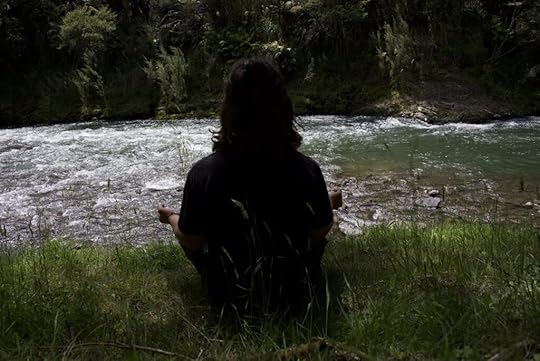
I brought as much food as I could in a Hiking backpack and two giant garbage bags full of dry, lightweight food, like beans and ramen noodles. I had a few nice luxuries, like canned pineapples soaking in pineapple juice, but the weight from those cans made me immediately regret my decision. But man were those good days when I got to have some sweet pineapple instead of beans.

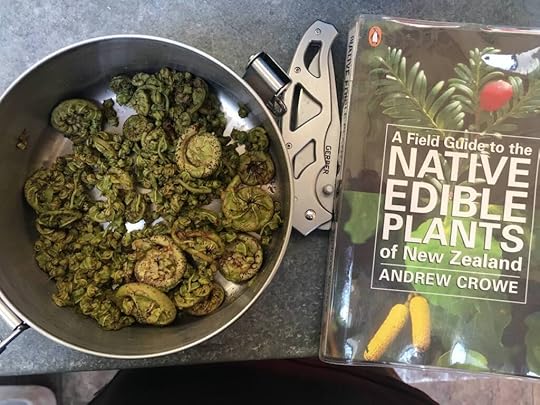
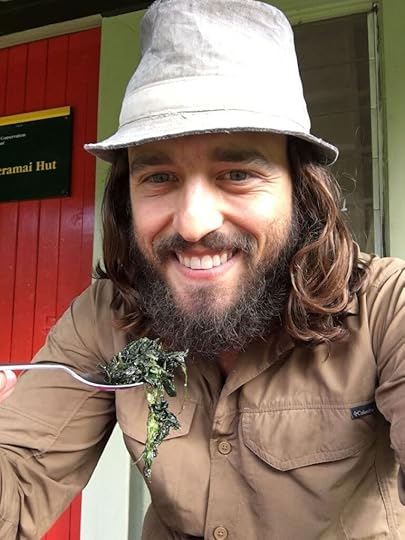


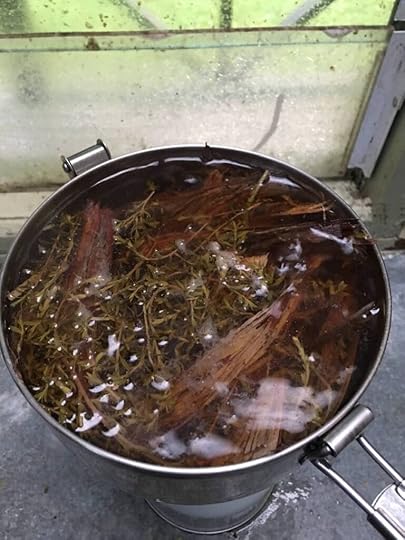 How did you manage to hike so far with so much stuff?
How did you manage to hike so far with so much stuff?Initially I tried to carry everything all at once: a hiking backpack, a smaller book bag went around my chest, and a hefty garbage bag in each hand. After about a mile of going way too slowly, I tied up my garbage bags to a high tree branch so deer and horses couldn’t eat my food, hiked the rest of the way and then came back for the bags with an empty hiking backpack and was able to get everything through those two trips.
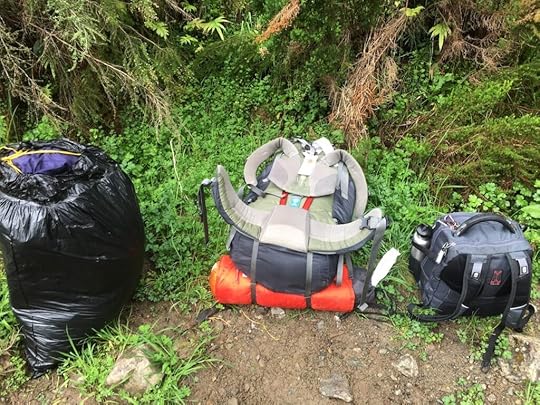
Out of the fifty days, three groups of hikers or hunters did come by for brief talks as they were passing through. At first I was not excited to talk to anyone, as my plan was to be in silence the whole time, but by the end of my time I was happy when people came by to chat and tell me about the news I had missed.
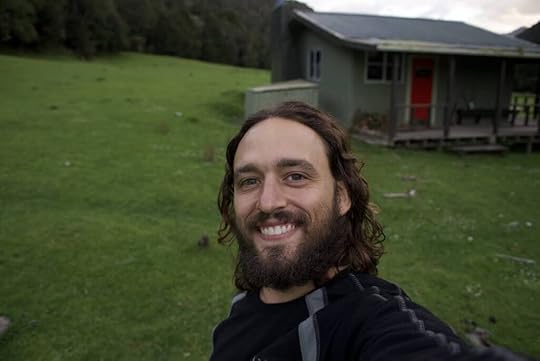
The middle of the forest was a four-day hike away to the entrance of the park, where there was a small village with no cell service. From there it was about a 2 or 3 hour drive to the closest city with hotels and restaurants.
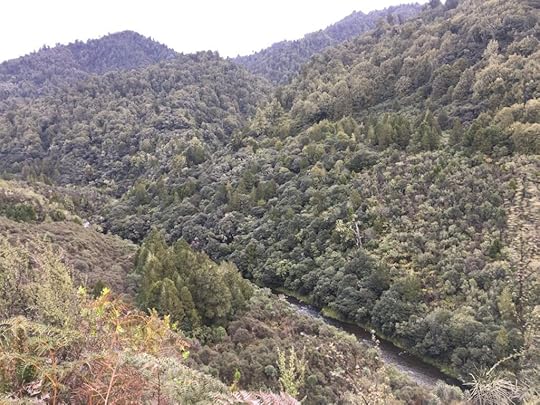
The hike was around 20 miles to my final destination. It took several days because of the mountainous terrain and the extreme weight of the food I brought into the forest. Coming out of the forest was like a dream by comparison.
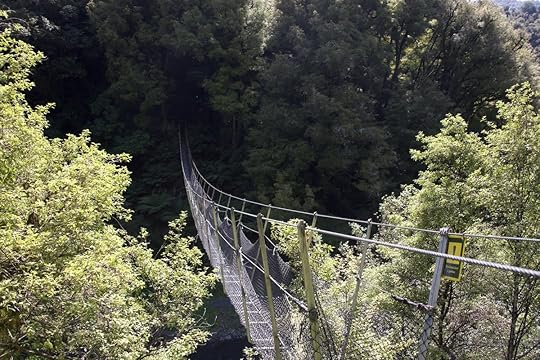
I wasn’t too scared except when I first got to the middle of the forest, and the one time when I got lost. You really feel the isolation when you first get out there. And the place I settled in the middle of the forest happened to be this spot near the corner of four different separate maps. I thought I was being smart by saving money and only buying 3 maps where I figured I’d be spending most of my time, but one day exploring a trail I had veered off the 3 maps and I got lost when the trail disappeared. Luckily, by sheer miracle, my phone, which had died, was broken, and had no service, magically turned back on, got service for one second, and a blue dot dropped on the map for the first time since I’d been in the forest. That was enough to tell me where I was and I was able to find my way back. The phone never worked again.
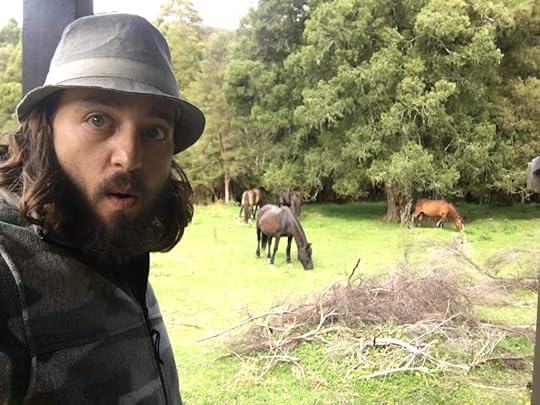
I had spent two years learning and practicing meditation in silent retreats, and this was essential to my successful 50 days.
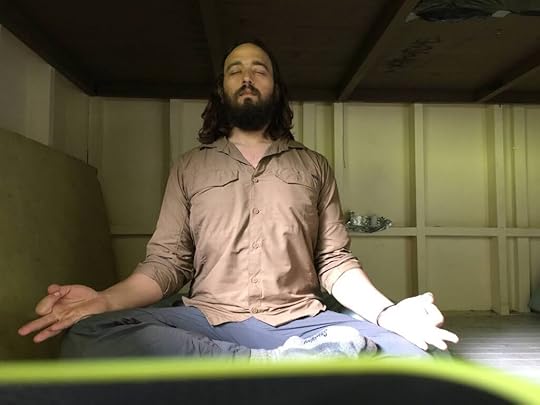
I had gone on several solo camping trips in upstate New York when I was living in New York City, and this really trained me not just in dealing with extended isolation, but really honing my survival skills as well.
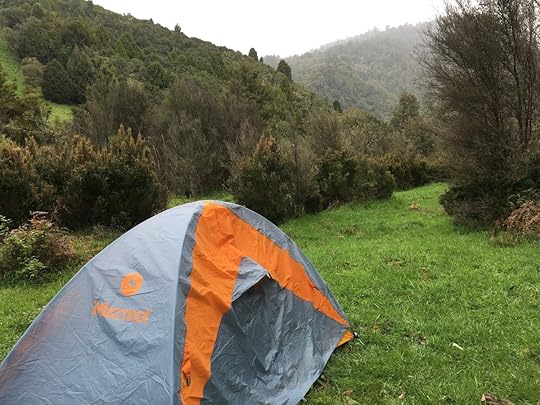
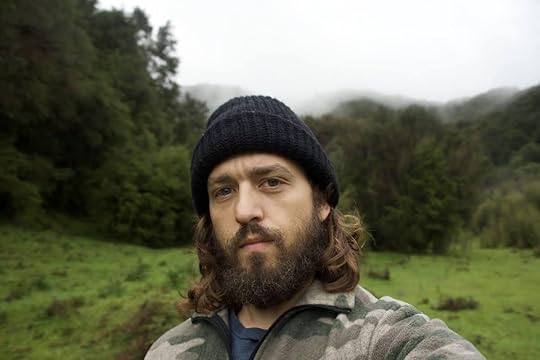
I would definitely not recommend this to anyone, even though it was the greatest experience of my life. That’s because it’s very dangerous. I went because I love solo camping and it was an inescapable pull. But what I learned after returning is that it’s our daily practice that matters most. If I never meditated after the forest, I would lose what I had gained. Spirituality to me is not about leaving life, it’s about using spirituality to deal with the stresses of life. That’s the magic to me.
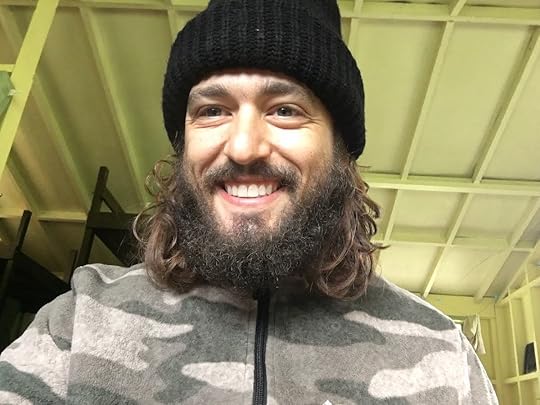
The post 50 Days in the Forest | Extreme Meditation Experience appeared first on EastWesticism.
April 5, 2024
Anxiety Issues Making It Hard to Date
There are a few things we can do to lower anxiety. One way is to boost our confidence. This is done through practice and self-trust, so one thing to do is to try to have a meaningful (roughly 30-second) conversation with everyone you encounter, in a way that goes just slightly deeper and more original than “How’s the weather?” Use your surroundings to connect. This all helps us get out of our head and be present.
Another thing we can do is to really watch those stories in our head that surround our anxiety. They usually tell us we’re undeserving and unworthy, things that extroverts don’t even consider. So try noticing the stories, see how they’re untrue (they are only your fear’s opinion), and craft a better one. If you’re awkward, own it! Be happily awkward. THAT is confidence. We call those people fun and eccentric and we love them.
Keep putting yourself out there. Stay present and relax any tension in the body. It will start to feel natural eventually
Join The 10,000 Mental Steps ChallengeThere is nothing more important than your mental peace
Email JOINThe post Anxiety Issues Making It Hard to Date appeared first on EastWesticism.
Path to Peace Is Success More Important Than Happiness?
Society rewards success. It is the most alluring addiction there is because it is the only addiction that we are celebrated for having. It becomes ingrained into everyone of us that we should delay our happiness until we have achieved success later in life.
But what happens when we postpone our happiness? Is happiness greater than success? Will wealth bring us happiness? Can we have both success and happiness?
In today's podcast, I talk about the current debate between happiness and success. I share some ways we can think about what success really means. And I answer the age old question of how we can truly live a meaningful and fulfilling life.
Please enjoy other episodes where I share meditation techniques, tips and spiritual lessons from around the world for peaceful and stress-free living. Remember to subscribe to stay up-to-date.
*****
If you ever feel like my words brought a change in your life, and want to show your SUPPORT for what I am doing, click here.
Find all of my BOOKS for wherever you are on your spiritual journey: https://www.eastwesticism.org/spiritual-meditation-books/
Want to gift a book to a prisoner? Go here.
The post Path to Peace Is Success More Important Than Happiness? appeared first on EastWesticism.
April 2, 2024
Do We Need a Relationship or Partner to Complete Us?
If we overthink about it, life can be very confusing. There is so much information that we are bombarded with daily, from ads to movies, from social media to our in-person interactions. Within all of that information are subtle cues that tell us how life should be, what a perfect life looks like, and how you’ll finally be happy if only (fill in the blank). But, all of that noise is enough to drown out our intuition. And so, swirling around in our head is 98% other people’s thoughts and opinions and only 2% our own thoughts. This is because only 2% of our lives are given to quiet reflection, introspection and contemplation.
If we can take some time each day to process all of that information we’re bombarded with, we can start to undo some of that societal conditioning and find out who we are and what we want deep down. No two people are alike. Some people have found peace in a cave. Others find it in large, beautiful, messy, loving, overbearing, drama-filled families. Every person is different, and there are pros and cons to both choices. Rather than worrying about making the right choice or not, follow your heart, play, explore, try new experiences and take chances (safely of course). This is how we can find out what lights up our heart.
If feelings of fear of rejection or relationship anxiety come up, that doesn’t mean relationships are wrong for you. It simply means there are some irrational, conditioned responses that you have acquired, and that you can spend some time exploring and working through as well. Breaking through barriers like fear is one of the most rewarding achievements a person can make.
Ultimately, and in ideal circumstances, humans are social creatures and we thrive off of close-knit communities. But, that doesn’t have to be romantic. Simply two people sharing a loving space with each other is healing, not just mentally and spiritually, but physically as well. Not all relationships have to look like a 1950s sitcom. They can be long-term or short-term, traditional or nontraditional. Our lives are up to us to make them as we wish, and as long as it’s regarding consensual adults, as long as we are kind and respectful, no one can tell us what that should or shouldn’t look like. Not even me.
Every great love story, no matter who it’s with, starts with the love we have for ourself — our true self. Take the journey within, in the book, Finding Your True Self: A Love Story.
Path to Peace with Todd Perelmuter Newsletter Email SubscribeThe post Do We Need a Relationship or Partner to Complete Us? appeared first on EastWesticism.



